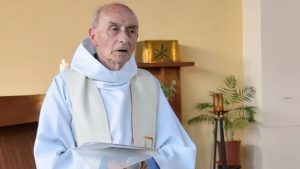
By Sarah Mac Donald - 12 September, 2016

The events of 26 July in Rouen brought us face to face once again with red martyrdom in humanist Europe, Archbishop Michael Jackson said on Sunday as he recalled Fr Jacques Hamel’s “excruciating experience and mind–numbing murder”.
In his homily at a service for those attending the annual conference of the British–Irish Association (BIA) at Pembroke College Oxford, the Church of Ireland Primate focused on the murder of Fr Hamel as he celebrated the Eucharist at St–Etienne–du–Rouvray near Rouen.
He said the elderly French priest had “lost his life at the premeditated and brutal hands of a young man almost a quarter of his age and undoubtedly much stronger than he”.
Dr Jackson said it was also important to recall the witness of the small gathered community of St–Etienne–du–Rouvray – the ecclesia, who “represented and still represent something that runs deep in the Judaeo–Christian Scriptures, the anawim, the poor in spirit, the inconsequential in the world then as now and undoubtedly also tomorrow”.
In a world where “selfie–celebrity–status has not only skewed our concentration on things beyond ourselves but has also enhanced our over–concentration on our own banalities, brilliances and self–importance”, the Archbishop suggested that these events were an early morning wake up call for those who feel the Fast Lane is made for them and they for it.
While some might say that the people in church had nothing else to do, or nothing better to do, another might argue that they were praising God and praying for those who were not present, “praying for the world, as an act of worship, however small but, in their terms, not insignificant”.
Dr Jackson asked if a long refined and substantially unchallenged understanding of laicite had resulted in France today seemingly having almost no comprehension of religiosite.
“This has come to the fore with almost every public articulation around Paris, Nice, Rouen. The vocabulary and the grammar simply are not there. There seems to be no official capacity or appetite to ‘get’ the narrative of any faith or religion as having an integrity or foothold,” he said.
He stressed that nobody is asking officialdom to agree with a religion or to practise it, just to understand it and protect it.
Referring to the burkini ban, he said that though it seemed acceptable to the French authorities locally in Villeneuve–Loubet near Nice and elsewhere, internationally it caused much outrage.
It exposed political divisions over Islam and secularism in France and it highlighted a sense of entitlement to dismantle a deeply held and required cultural decorum around that great unresolved ancient and modern conundrum: the body.
“A French Court had to rule that such cultural and ethnic bulldozing was an infringement of fundamental rights,” he noted.
Closer to home, Archbishop Jackson said, “We in these islands pride ourselves on a true liberalism and yet most people wallow in a laissez–liberalism of popular indifferentism and touchiness over any invasion of ‘our space’.”
He added that we may need to ask ourselves if we are moving quite far down the track of un–generous liberalism and, if we decide that we are, we need to ask if this is where we want to be.
“In a multi–cultural world, people will not stop witnessing to their faith, however irritating and embarrassing they might be, or living their emotional culture of primary identity,” he stated.
The Church of Ireland Primate of Ireland said salvation and redemption, justice and righteousness lead us into words like reconciliation and restoration, dignity and compassion.
“Those who travel in the Fast Lane are going nowhere without those on the Outside and those at the Bottom of the Heap,” he warned.